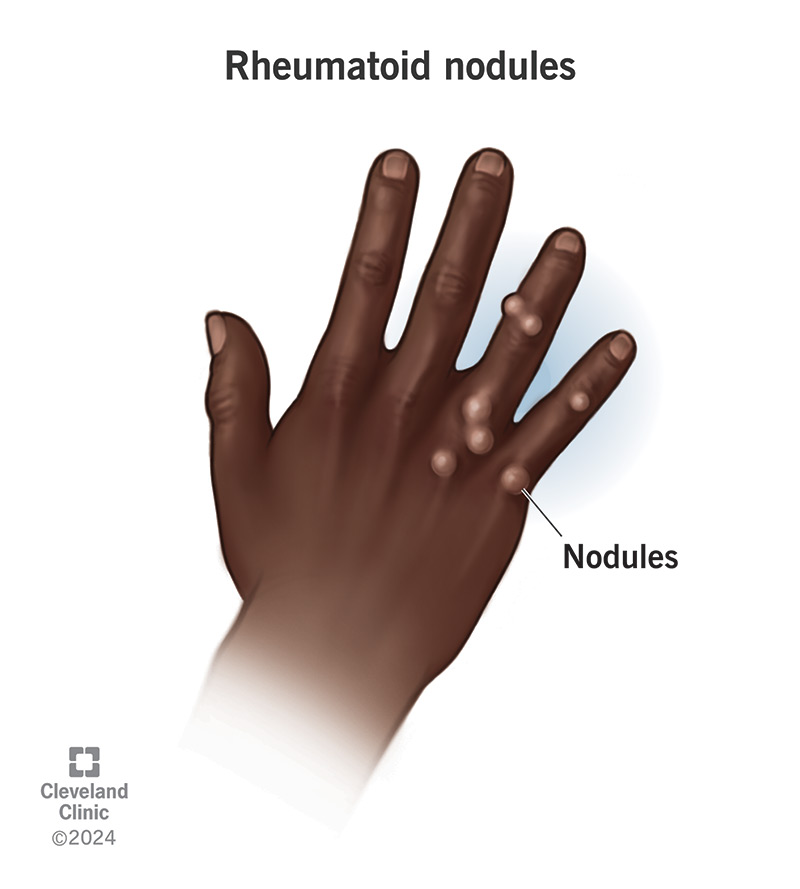Rheumatoid nodules are clusters of cells that form under your skin or in or near your organs. They’re a type of benign (noncancerous) tumor that develops in some people with moderate to severe rheumatoid arthritis. It’s rare to need surgery to remove them. Your provider can suggest treatments if they don’t go away on their own.
Advertisement
Cleveland Clinic is a non-profit academic medical center. Advertising on our site helps support our mission. We do not endorse non-Cleveland Clinic products or services. Policy

Image content: This image is available to view online.
View image online (https://my.clevelandclinic.org/-/scassets/images/org/health/articles/rheumatoid-nodules)
Rheumatoid nodules are bumps that may form under your skin or inside your body when you have rheumatoid arthritis (RA).
Advertisement
Cleveland Clinic is a non-profit academic medical center. Advertising on our site helps support our mission. We do not endorse non-Cleveland Clinic products or services. Policy
A nodule is the medical term for a tumor that’s less than an inch (around 3 millimeters) across. Rheumatoid nodules are benign (noncancerous). Having them isn’t a sign of cancer and doesn’t mean you’ll develop cancer later. They’re made of clumped up cells that usually include:
Rheumatoid nodules usually develop near parts of your body that you use a lot during your everyday routine. Some of the most common places include:
It’s less common, but rheumatoid nodules can also form in other places of your body, including inside your:
The nodules may feel firm (like a small pebble trapped under your skin), but they can also feel squishy (like a stress ball). They can range in size from smaller than a pencil eraser to as big as a computer mouse (nodules this big are rare).
Rheumatoid nodules don’t usually hurt, but the area around them can feel tender — especially if they’re near a joint where you’re experiencing RA symptoms.
Advertisement
You usually won’t be able to feel nodules in your lungs, eyes or vocal cords. You may not even know you have them until they show up as an incidental finding during an imaging test like an X-ray or part of your routine eye exam.
The same autoimmune response that causes rheumatoid arthritis also causes rheumatoid nodules. But not everyone with RA gets rheumatoid nodules. Experts estimate that between 25% and 40% of people with RA develop rheumatoid nodules. And less than 1% of people with RA get nodules in their lungs, eyes or vocal cords.
If you have RA, your immune system attacks tissue in your joints and causes inflammation. Over time, this inflammation damages your affected joints and causes symptoms like pain and stiffness. It’s an autoimmune disease — any health condition where your immune system hurts your body instead of protecting it.
If your immune system is overly active, it can irritate tissue throughout your body, especially around joints you use a lot. For example, if you have RA and use your hands a lot (like working with tools), you might have a higher risk of developing rheumatoid nodules around your fingers.
You’re more likely to have rheumatoid nodules if you have a high rheumatoid factor or cyclic citrullinated peptide (CCP) antibodies. A healthcare provider can check your levels with a blood test.
You may not need treatment for rheumatoid nodules. Sometimes, they go away on their own. In the same way that RA symptoms can come and go (flares or flare-ups), you might notice that rheumatoid nodules appear, then reabsorb back into your body without any treatment.
How long they last can vary depending on where they develop, which stage of RA you have and your overall health.
Your provider may give you treatments for rheumatoid nodules if they’re painful or don’t go away on their own. Your provider can also treat rheumatoid nodules if having them affects your self-confidence.
Common rheumatoid nodule treatments include:
Advertisement
You probably won’t need surgery to remove rheumatoid nodules. Your provider might suggest surgery to remove them if they:
Visit a healthcare provider if you notice any changes or new symptoms on or under your skin. If you have RA, you may already be managing it with treatments. Tell your provider if it feels like your treatments aren’t working as well as they used to.
Your provider will want to keep an eye on rheumatoid nodules, especially if you’ve never had them before. They’ll tell you when you’ll need follow-up appointments and when to contact them if anything changes.
It can be surprising to notice new growths under your skin, especially if you’ve never experienced anything like that before. The good news is that you may not need any treatments to make rheumatoid nodules go away. And, even if you do, many of the treatments are the same as managing rheumatoid arthritis, which you may already be doing.
Advertisement
It’s always a good idea to get new growths, lumps or bumps checked out. Even though rheumatoid nodules are usually harmless, make sure you talk to your provider as soon as you notice them. Tell your provider if rheumatoid nodules get in the way of doing your job, your hobbies or affect your self-esteem. They can discuss options to shrink or remove the nodules to help you feel safe and confident during all your favorite activities.
Advertisement

Sign up for our Health Essentials emails for expert guidance on nutrition, fitness, sleep, skin care and more.
Learn more about the Health Library and our editorial process.
Cleveland Clinic’s health articles are based on evidence-backed information and review by medical professionals to ensure accuracy, reliability and up-to-date clinical standards.
Cleveland Clinic’s health articles are based on evidence-backed information and review by medical professionals to ensure accuracy, reliability and up-to-date clinical standards.
Rheumatoid arthritis is a chronic condition, but with the right treatment, you can manage it. Cleveland Clinic is here to help you live an active life.
